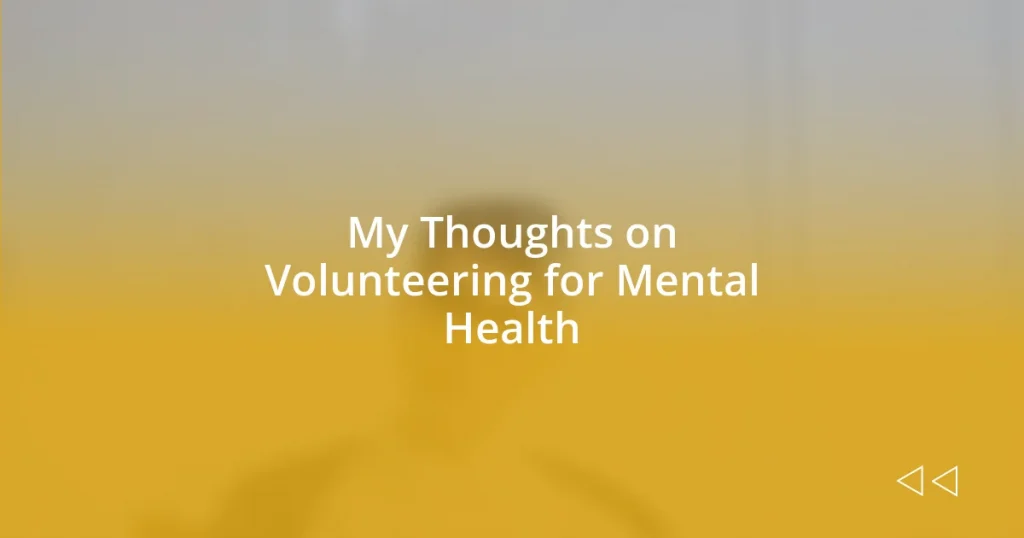Key takeaways:
- Mental health care enhances self-awareness and coping mechanisms, fostering emotional resilience through community support and shared experiences.
- Volunteering impacts both volunteers and participants by creating a sense of belonging, empathy, and opportunities for personal growth while reducing stigma around mental health.
- Effective volunteering involves setting clear goals, building supportive networks, and practicing self-care to maintain one’s ability to help others meaningfully.
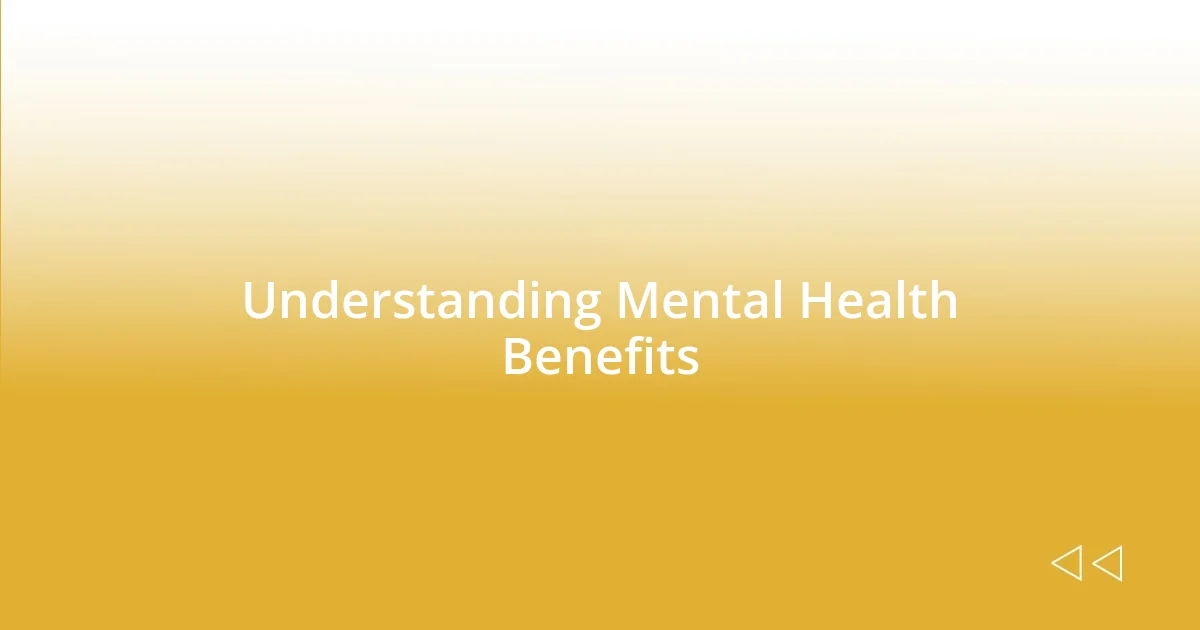
Understanding Mental Health Benefits
The benefits of mental health care are vast and often intertwined with our daily lives. I remember a time when I faced overwhelming anxiety; it was a tough battle. Seeking help not only steadied my emotional state but also allowed me to discover coping mechanisms I never knew existed. Isn’t it fascinating how one conversation can spark a journey of self-discovery and resilience?
Mental health care promotes self-awareness, encouraging us to understand our triggers and emotional responses better. I’ve seen friends transform their lives by simply learning how to articulate their feelings. When I first learned to express what was going on inside my mind, it felt like lifting a heavy weight off my shoulders. Doesn’t expanding our emotional vocabulary empower us to handle life’s challenges more effectively?
Moreover, participating in support groups or wellness activities fosters a sense of belonging. I’ve experienced firsthand how sharing stories with others who understand can lift the spirit. It’s comforting to realize that we’re not alone in our struggles. How often do we underestimate the power of community when it comes to healing?
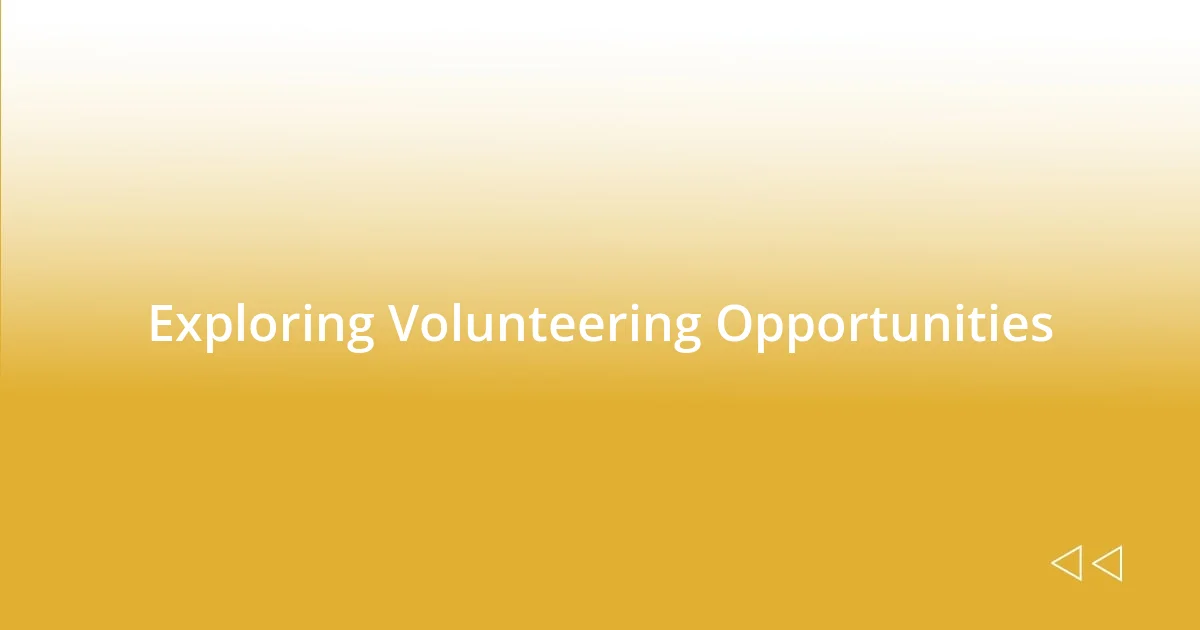
Exploring Volunteering Opportunities
Volunteering for mental health initiatives can take many forms, each offering unique experiences and insights. I found that diving into opportunities at local mental health organizations opened my eyes to the different ways I could make a tangible difference. For example, whether it’s being a listening ear at community workshops or assisting with administrative tasks, each role plays a crucial part in supporting those in need. Have you considered how even the smallest contribution can create a ripple effect in someone’s life?
As I explored volunteering options, I discovered that online platforms have emerged as valuable resources for connecting volunteers with organizations. I signed up for a virtual mental health advocacy program and was amazed at the diverse backgrounds of fellow volunteers. Some brought lived experiences, while others offered professional expertise. The dynamic energy in those sessions reminded me how enriching it is to collaborate with people who share a similar passion for mental wellness. Don’t you think it’s exciting to engage with others who are equally passionate about making a change?
In my journey, I’ve also seen the importance of finding a cause that resonates personally. For instance, volunteering for youth mental health initiatives struck a chord with me because I’ve witnessed the challenges young people face today. I remember my own struggles during my teenage years and realizing how vital support systems were during that time. By focusing on areas that touch our hearts, we can commit ourselves to the cause more vividly, fostering both personal growth and community impact. What about you? What causes ignite your passion for helping others?
| Type of Volunteer Opportunity | Description |
|---|---|
| Community Support Groups | Engaging directly with individuals through shared experiences and discussions. |
| Advocacy Programs | Working to raise awareness and promote mental health resources in public spaces. |
| Online Workshops | Delivering valuable content and support through virtual platforms to reach wider audiences. |
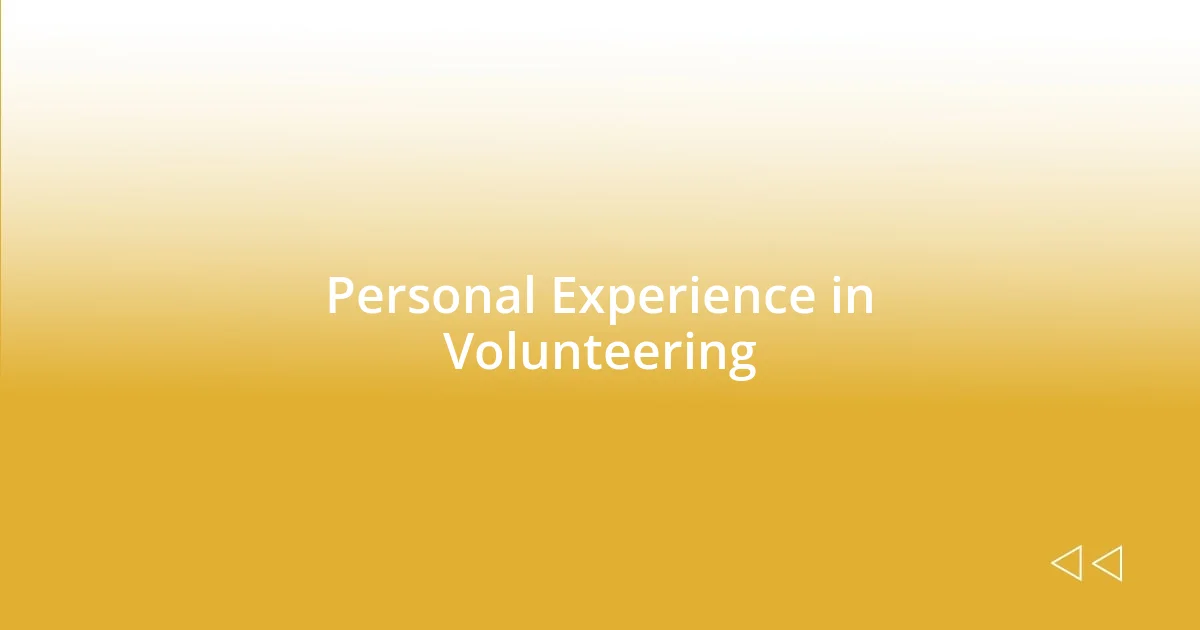
Personal Experience in Volunteering
I recall my first day volunteering at a mental health clinic. As I walked in, a mix of excitement and nervousness washed over me. I was tasked with helping set up a community discussion group, and I could feel my heart race as I anticipated what stories would emerge. Listening to participants open up about their struggles was humbling; it reminded me of how difficult it can be to voice one’s feelings, something I had a hard time with not too long ago. Witnessing their bravery encouraged me to embrace my own vulnerabilities, reinforcing the sense of connection we all crave.
- My initial anxiety transformed into understanding as I listened to shared experiences.
- Each story became a reminder of the importance of compassion and empathy.
- I learned that even the smallest act—like providing a smile or a nod—can validate someone’s feelings.
As I became more involved, I discovered how profoundly volunteering could impact my mental landscape. I remember a moment when a participant thanked me for simply being there. It struck a chord deep within me; I realized that my presence—my willingness to listen—could mean the world to someone. This simple exchange fueled my commitment to volunteering; it wasn’t just about helping others, but also about fostering a community that uplifted all of us.
- Moments of gratitude offered by those in need were incredibly heartwarming.
- Each session taught me about resilience, not just theirs, but mine too.
- Understanding how interconnected our mental health journeys are transformed my perspective on support.
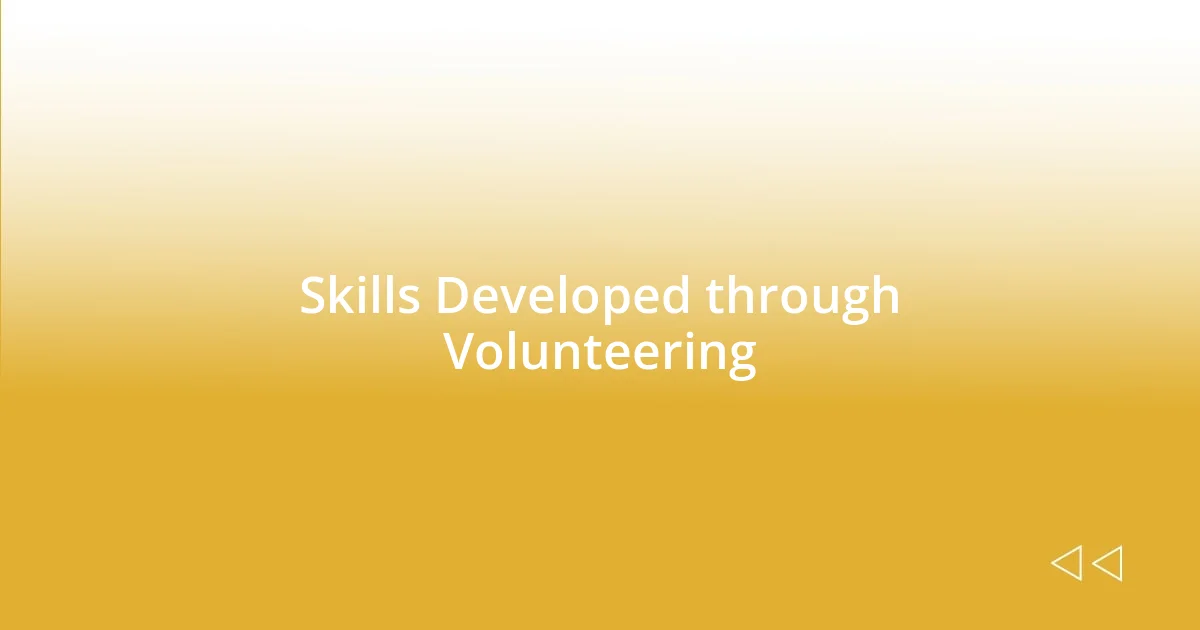
Skills Developed through Volunteering
There’s something genuinely transformative about the skills we acquire through volunteering. For example, I never realized how effectively I could communicate until I found myself facilitating discussions in group therapy settings. Each time I encouraged someone to share their story, it deepened my active listening skills. It’s like discovering a layer of connection that transcends words. Have you ever felt that moment when someone finally opens up, and you realize just how powerful being present can be?
As I dove deeper into my volunteering experience, I also honed my organizational skills. I remember coordinating an awareness event, where juggling logistics, managing timelines, and collaborating with various participants tested my abilities. But oh, the sense of accomplishment when everything came together! It made me appreciate how structure supports meaningful interactions. Doesn’t it feel satisfying when all the moving parts click into place?
Moreover, volunteering has taught me a thing or two about resilience. There were days when I faced tough conversations that weighed heavily on my heart. Yet, being there for others helped me cultivate my coping strategies. I learned how to balance my emotional responses while providing support, which I believe has made me more emotionally intelligent. Have you ever considered how helping others can actually boost your own mental well-being? It’s incredible how intertwined our journeys can be.
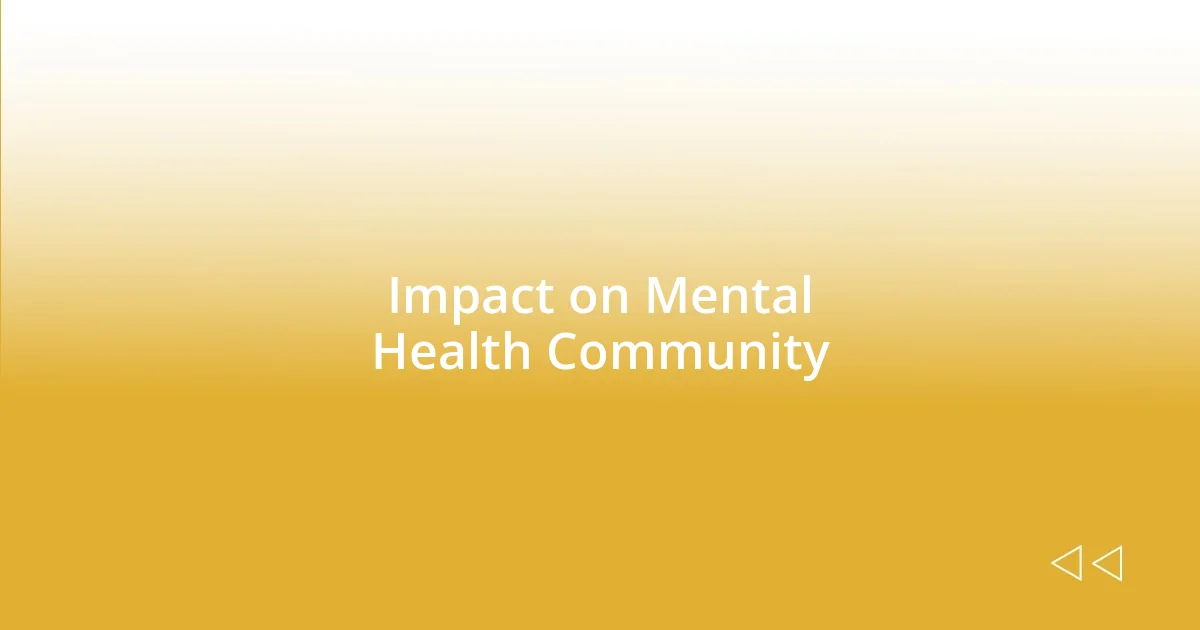
Impact on Mental Health Community
Volunteering in the mental health community has a profound ripple effect. During my time at the clinic, I saw firsthand how shared experiences broke down barriers. One evening, as we gathered for a support circle, I could feel the energy in the room shift when a participant shared their story. The vulnerability hung in the air, and it was amazing to witness how everyone leaned in closer, creating a sense of unity that transformed our individual struggles into collective strength.
This sense of belonging isn’t just beneficial for the participants; it extends to volunteers too. I remember one day feeling particularly low, but being surrounded by others who openly discussed their challenges helped lift my spirits. It’s like we were all part of an unspoken pact to support one another. Have you ever felt empowered by simply being in the right space? That’s the magic of a community that prioritizes mental well-being; it fosters resilience and encourages everyone to seek help and healing together.
Moreover, volunteering creates opportunities for education and awareness, which is vital for reducing stigma around mental health. I once organized a small workshop where we discussed common misconceptions. It was eye-opening to see the shift in understanding among participants; animated discussions erupted, and questions flowed freely. The realization that knowledge can serve as a bridge to understanding is empowering. Doesn’t it inspire you to think that every conversation can lead to greater awareness and compassion? It’s this shared journey toward understanding that fortifies our mental health community, reminding us that we are all in this together.
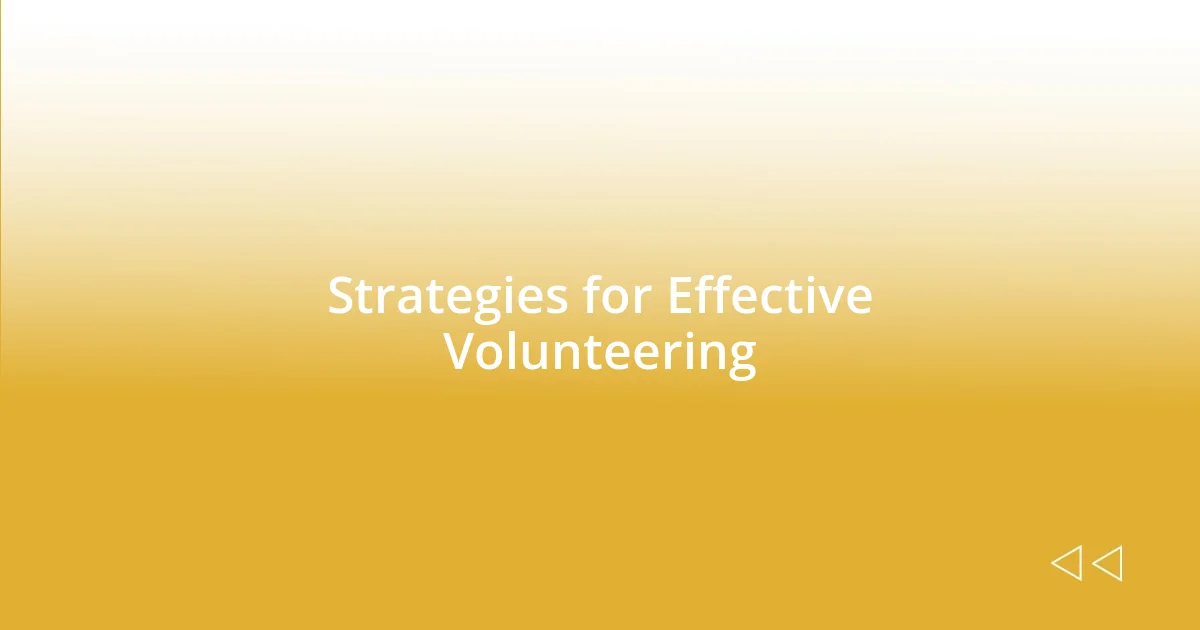
Strategies for Effective Volunteering
When it comes to effective volunteering, setting clear goals is essential. I remember my first day volunteering at a mental health outreach program; I went in with no specific aim. It felt chaotic, and I found it hard to make a meaningful impact. However, after I started creating personal objectives—like improving my counseling skills or learning how to run workshops—I noticed that my contributions were more focused and impactful. Have you ever noticed how a little direction can make all the difference?
Creating a supportive network is another key strategy. During one of our weekly meetings, I connected with another volunteer who shared similar passions. Our collaboration led to designing a series of creative activities that allowed participants to express themselves through art. This experience highlighted to me that working together not only amplifies our efforts but also adds layers of friendship and understanding. Isn’t it amazing how shared dreams can blossom into reality when we support one another?
Lastly, I can’t stress enough the importance of self-care. In those early days, I often neglected my own needs while focusing on others. After facing burnout, I learned to integrate self-care practices into my routine—things like mindfulness exercises and setting boundaries with my time. This shift not only rejuvenated my spirit but also enhanced my ability to serve effectively. Have you ever had to hit pause for your own well-being to truly show up for others? It’s crucial to remember that being at our best allows us to give our best.
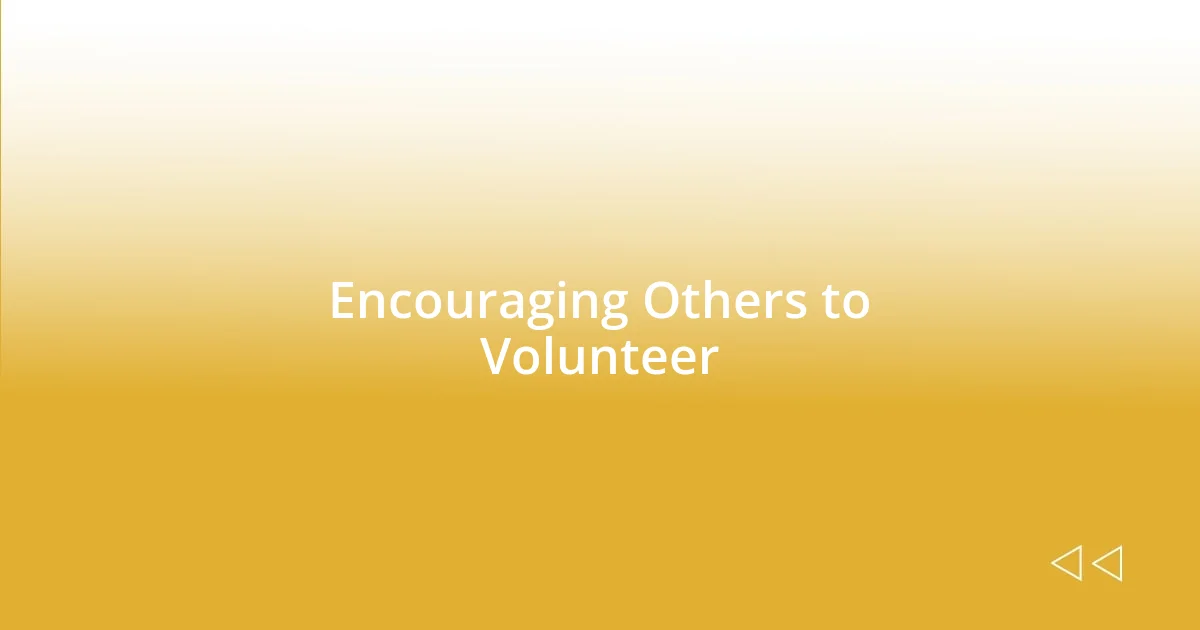
Encouraging Others to Volunteer
Encouraging friends and family to volunteer can feel challenging, but it’s incredibly rewarding. I often share my own experiences, like the time I volunteered at a mental health event where I met some truly inspiring individuals. Hearing how they overcame their struggles sparked something in me that I wanted everyone around me to experience. Have you ever thought about how a simple invitation can alter someone’s perspective? Sometimes, all it takes is one person to nudge us out of our comfort zones.
When I invite friends to join me in volunteering, I try to highlight how it benefits not just the community but our personal growth as well. After my first workshop, I felt a renewed sense of purpose that radiated into my everyday life. I remember telling my friend about it, and the way her eyes lit up made me realize the power of sharing these moments. Isn’t it fascinating how stories of joy and fulfillment resonate with those around us? Encouragement can breed enthusiasm; the more we discuss these positive experiences, the more likely others will feel compelled to join.
Furthermore, creating opportunities for involvement can spark interest. I once organized a casual volunteering meet-up, inviting people to explore various ways to get involved in local mental health initiatives. Seeing friends network and engage with others who share similar passions ignited a collective excitement. Have you noticed how inviting collaboration can energize a group? It’s similar to planting seeds of inspiration; what starts as a simple suggestion can cultivate a beautiful garden of volunteerism in our communities.










